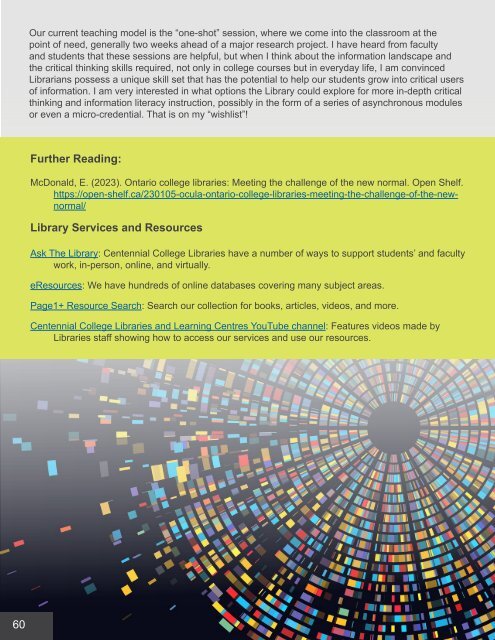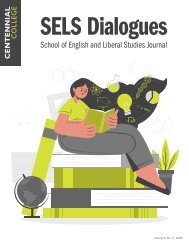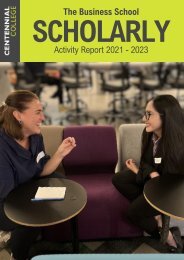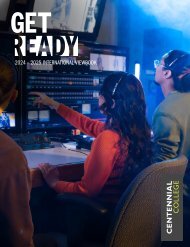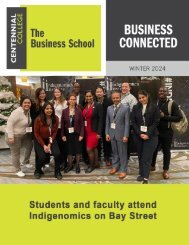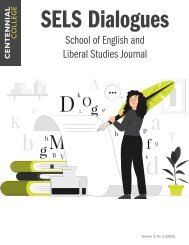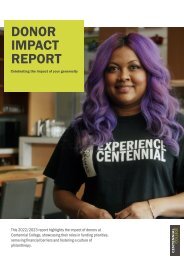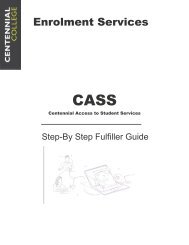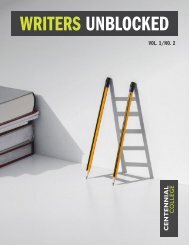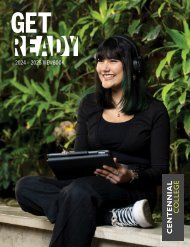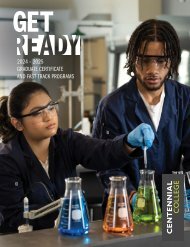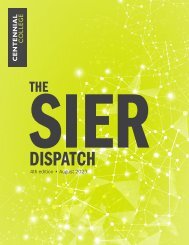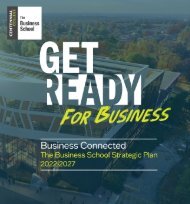The Teaching and Learning Innovation Digest - May 2023
Welcome to a truly special edition of the Teaching and Learning Innovation Digest! Our seventh annual academic publication has assumed an incredibly meaningful shape and form for a number of reasons. Not only did we receive an enthusiastic response with over 30 submissions via our institutional broadcast, but we also have consciously and intentionally embraced the principles of Universal Design for Learning by attempting to represent and celebrate the varied forms of expressions therein. From reflective essays, poetry, visual and performing arts, podcasts, video conversations to scholarly work, academic and applied research, news and updates, and interviews, this is truly a power-packed publication!
Welcome to a truly special edition of the Teaching and Learning Innovation Digest! Our seventh annual academic publication has assumed an incredibly meaningful shape and form for a number of reasons. Not only did we receive an enthusiastic response with over 30 submissions via our institutional broadcast, but we also have consciously and intentionally embraced the principles of Universal Design for Learning by attempting to represent and celebrate the varied forms of expressions therein. From reflective essays, poetry, visual and performing arts, podcasts, video conversations to scholarly work, academic and applied research, news and updates, and interviews, this is truly a power-packed publication!
Create successful ePaper yourself
Turn your PDF publications into a flip-book with our unique Google optimized e-Paper software.
Our current teaching model is the “one-shot” session, where we come into the classroom at the<br />
point of need, generally two weeks ahead of a major research project. I have heard from faculty<br />
<strong>and</strong> students that these sessions are helpful, but when I think about the information l<strong>and</strong>scape <strong>and</strong><br />
the critical thinking skills required, not only in college courses but in everyday life, I am convinced<br />
Librarians possess a unique skill set that has the potential to help our students grow into critical users<br />
of information. I am very interested in what options the Library could explore for more in-depth critical<br />
thinking <strong>and</strong> information literacy instruction, possibly in the form of a series of asynchronous modules<br />
or even a micro-credential. That is on my “wishlist”!<br />
Further Reading:<br />
MATHEMATICAL<br />
DISCOURSE<br />
An open-ended tool to re-engage in learning<br />
Dr. Richard Williamson <strong>and</strong> Tongyu Zhang<br />
Faculty <strong>and</strong> student, School of Advancement (SOA)<br />
McDonald, E. (<strong>2023</strong>). Ontario college libraries: Meeting the challenge of the new normal. Open Shelf.<br />
https://open-shelf.ca/230105-ocula-ontario-college-libraries-meeting-the-challenge-of-the-newnormal/<br />
Library Services <strong>and</strong> Resources<br />
Ask <strong>The</strong> Library: Centennial College Libraries have a number of ways to support students’ <strong>and</strong> faculty<br />
work, in-person, online, <strong>and</strong> virtually.<br />
eResources: We have hundreds of online databases covering many subject areas.<br />
Page1+ Resource Search: Search our collection for books, articles, videos, <strong>and</strong> more.<br />
Centennial College Libraries <strong>and</strong> <strong>Learning</strong> Centres YouTube channel: Features videos made by<br />
Libraries staff showing how to access our services <strong>and</strong> use our resources.<br />
With our full return to campus this year, we<br />
consider what it means to come back together<br />
<strong>and</strong> re-engage—reassemble, reconnect,<br />
rework, reimagine, <strong>and</strong> rethink our teaching<br />
practices, <strong>and</strong> our learning experiences as<br />
students. During the height of the p<strong>and</strong>emic,<br />
the learning environment at Centennial<br />
College changed to suit the needs of the<br />
situation. Classes were moved online through<br />
Zoom or other communication software. In this<br />
context, teachers tried to recreate a learning<br />
environment that is similar to in-person classes<br />
by incorporating as many participatory activities<br />
as possible. Through this process, insight was<br />
gained through the attempts of recreating the<br />
in-person learning environment. <strong>The</strong>se insights<br />
not only benefit the online learning<br />
environment, but they also help teachers<br />
rethink improvements to in-person learning<br />
through an underst<strong>and</strong>ing of the need for<br />
student-centred learning. One of the insights<br />
is that the quality of online interaction among<br />
students was lacking in comparison to inperson<br />
due to the often instructor-centred<br />
approach. Through this experience, when<br />
students <strong>and</strong> teachers return to classes,<br />
professional practice can be re-thought <strong>and</strong> redesigned<br />
to better fit learning for students.<br />
This paper examines the concepts of<br />
discourse, more specifically mathematical<br />
discourse, in a postsecondary learning<br />
environment with its purpose being<br />
an additional process to improve<br />
learning. Within the scope of this paper,<br />
the word teachers is an umbrella term for<br />
instructors, professors, <strong>and</strong> other educators.<br />
It is important first to clarify what mathematical<br />
discourse represents. “Participating in<br />
mathematical discourse practices can<br />
be understood in general as talking <strong>and</strong><br />
acting in the ways that mathematically<br />
competent people talk <strong>and</strong> act when talking<br />
about mathematics” (Moschkovich, 2003,<br />
p. 326). Mathematical discourse is not a<br />
novel idea, it has been in scholarly articles<br />
since the early 1990s <strong>and</strong> it is still relevant<br />
to this day. It has been around for years<br />
<strong>and</strong> it provides evidence to support the<br />
implementation of mathematical discourse<br />
in the classroom. According to Gresham <strong>and</strong><br />
Shannon (2017), the usage of mathematical<br />
discourse was shown to be of help to students<br />
60<br />
61


